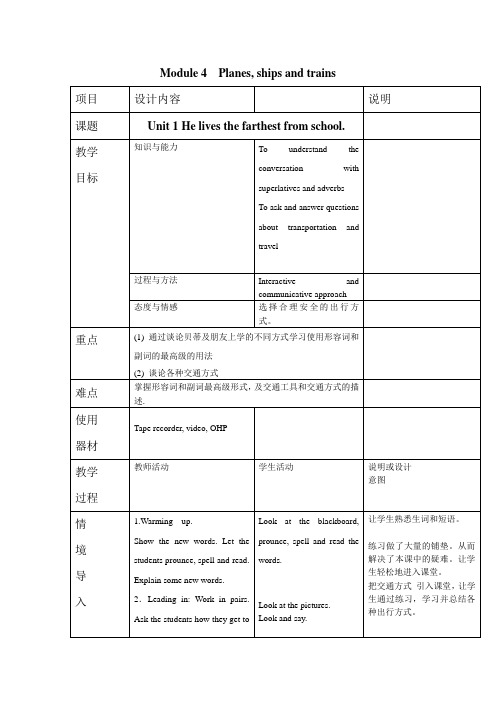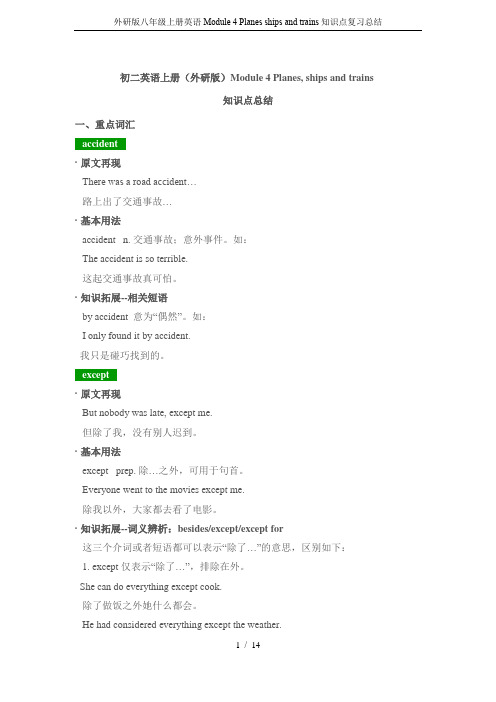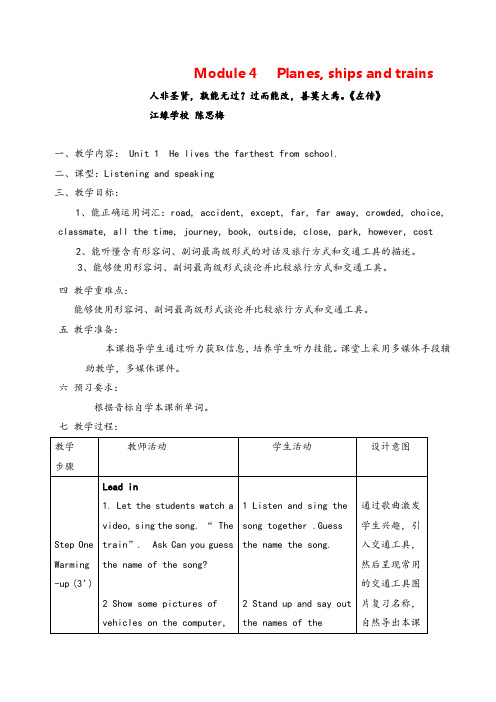外研版八上 Module 4 Planes,ships and trains Unit 1 He lives the farthest from school教案
- 格式:doc
- 大小:138.50 KB
- 文档页数:5



初二英语上册(外研版)Module 4 Planes, ships and trains知识点总结一、重点词汇·原文再现There was a road accident…路上出了交通事故…·基本用法accident n. 交通事故;意外事件。
如:The accident is so terrible.这起交通事故真可怕。
·知识拓展--相关短语by accident 意为“偶然”。
如:I only found it by accident.我只是碰巧找到的。
·原文再现But nobody was late, except me.但除了我,没有别人迟到。
·基本用法except prep. 除…之外,可用于句首。
Everyone went to the movies except me.除我以外,大家都去看了电影。
·知识拓展--词义辨析:besides/except/except for这三个介词或者短语都可以表示“除了…”的意思,区别如下:1. except仅表示“除了…”,排除在外。
She can do everything except cook.除了做饭之外她什么都会。
He had considered everything except the weather.他什么都想过,唯独没考虑到天气。
2. besides表示“除了…还有…”的意思,表示包含在内。
Besides milk and cheese, we need vegetables.除了牛奶和干酪外,我们还需要蔬菜。
Besides football, I like playing basketball and table tennis.除了足球以外,我还喜欢打篮球和乒乓球。
3. except for表示“除了…”,except for后接的词同句子中的整体词(主语)不是同类的,指从整体中除去一个细节,一个方面;而except后接的词同整体词(主语)一般是同类,指在同类的整体中除去一个部分。


Module 4 Planes, ships and trains人非圣贤,孰能无过?过而能改,善莫大焉。
《左传》江缘学校陈思梅一、教学内容: Unit 1 He lives the farthest from school.二、课型:Listening and speaking三、教学目标:1、能正确运用词汇:road, accident, except, far, far away, crowded, choice, classmate, all the time, journey, book, outside, close, park, however, cost2、能听懂含有形容词、副词最高级形式的对话及旅行方式和交通工具的描述。
3、能够使用形容词、副词最高级形式谈论并比较旅行方式和交通工具。
四教学重难点:能够使用形容词、副词最高级形式谈论并比较旅行方式和交通工具。
五教学准备:本课指导学生通过听力获取信息,培养学生听力技能。
课堂上采用多媒体手段辅助教学,多媒体课件。
六预习要求:根据音标自学本课新单词。
七教学过程:达标训练题A. 随学随练:写出下列单词的最高级形式:1. short _________________2. nice _________________3. big _________________4. thin _________________5. early _________________6. slowly _________________7. beautiful _________________ 8. carefully _________________9. badly _________________ 10. much _________________11. little _________________ 12. far __________________B. 单项选择:( ) 1. Debbie is growing fast. She is even________ than her mother.A. tallB. tallerC. tallestD. the tallest ( )2.—Dad, would you please drive ________?— No hurry. We have enough time before the plane takes off.A. fasterB. more slowlyC. more carefully( ) 3.—Do you know Lin Shuhao?—Yes. He is one of _____ basketball players in the NBA.A. popularB. more popularC. the most popular( ) 4. Is Lily’s home _____ away from school than Linda’s?A. farB. fartherC. farthest .( ) 5.—Who ran ______ of all in the sports meeting?—Hector did, I think.A. fastB. fasterC. the fastestD. most fast( ) 6. Li Na is ________ tennis player in China now.A. most famousB. the most famousC. more famous【素材积累】辛弃疾忧国忧民辛弃疾曾写《美芹十论》献给宋孝宗。

Module 4Planes, ships and trains Unit 1 He lives the farthest from school.一、短语翻译1. 远离2. 一直;不断地3. 上学迟到4. 乘出租车5. 小心点6. 和……一样二、单项选择1. — Who do you think sings __________ ?—Karen, she’s got the first place among the top ten singers.A. beautifullyB. more beautifullyC. the most beautifully2. —Hi, Jane! I’ll go to ShijiaZhuang next month.— Great! The glass bridge there is ________ than any other one in the world.A. longB. longerC. longestD. the longest3. We are happy to see our city is developing _______ these years than before.A. quicklyB. more quicklyC. very quicklyD. the most quickly4. The Nike is one of the ______ rivers in the world.A. longB. longerC. longestD. most longest5. — What do you think of your junior high school life?— I think it is one of ________ periods in my life.A. wonderfulB. more wonderfulC. much wonderfulD. the most wonderful三、根据语境用括号内所给单词的适当形式填空。
Module 4 Planes, ships and trains一、学习目标:A. 单词和短语:road, accident, except, far, far away, crowded, choice, classmate, all the time, journey, book, outside, close, park, however, costB. 交际用语:1. What happened?2. Don’t worry.3. —Who lives the closest to school?— Lingling lives closest.4. — What is the most comfortable way to go to school for Betty?— By taxi.5. —What’s the most expensive way to go to school?— Going by taxi is the most expensive.6. How do you get there?7. What’s the cheapest way?8. What’s the best way to get there?9. —What’s the cheapest way to travel from London to Paris?— The cheapest way is by coach.10. It’s the most comfortable way, but it’s the most expensive.11. He lives farthest from school.12. It is the fastest and the second cheapest.13. The more information, the better.二. 教学目标1. Function: Describing and comparing modes of transportation.2. Structure: Superlative adjectives and adverbs (-est, most); irregular superlatives.3. Skills: 1) Listening and understanding familiar topics (transportation)2) Comparing modes of transportation.3) Reading and finding specific transportation4) Writing a short passage comparing modes of transportation.4. Around the world: The longest railway5. Task: Making a holiday plan for a family trip to a city in China.三、重点及难点:Superlative adjectives and adverbs (-est, most); irregular superlatives.四、教学设计:Unit 1 He lives the farthest from school.ⅠTeaching modelListening and speakingⅡTeaching methodPWP approachⅢ Teaching aims1. Key vocabulary: road, accident, except, far, far away, crowded, choice, classmate,close, all the time2. Key structures:superlative adjectives and adverbs (-est, most); irregularsuperlatives.3. Key sentences:1) What happened?2) Don’t worry.3) — Who lives the closest to school?— Lingling lives closest.4) — What is the most comfortable way to go to school for Betty?— By taxi.5) —What’s the most expensive way to go to school?— Going by taxi is the most expensive.ⅣTeaching aidsTape recorder, OHP, videoⅤTeaching StepsStep 1 Warming-up1. Work in pairs. Show some pictures and ask “How do you often go to school/work?”“How do you often travel?”2. Look and say something about the pictures.Step 2 New wordsUsing pictures or sentences to learn the new words.Step 3 Listening and vocabulary1. Ask the students to read the words in Activity 1.2. Look at the pictures in Activity 1 carefully.3. Now match the words with the pictures.5. Check the answers with the students.Step 4 Look, listen and match.1. Ask the students to read the words in Activity2.2. Play the recording and ask the students to listen to the recording carefully.T: Listen and match the words in the box with the pictures in Activity 1. You need to use one word more than once.3. Check the answers with the students.Step 5 Reading1. Listen and answer the questions.1) How does Lingling go to school? Why?2) How do you think Betty will go to school?2. Ask the students to read the conversation silently.3. Ask the students to read the conversation again and complete the table.3. Check the answers.Step 6 Complete the sentences.1. Ask the students to read the words in the box in Activity 4.2. Read the sentences.1) The _________________ way to go to school is by taxi.2) Tony lives the __________ from school.3) Lingling’s home is the _________ to school, so she always walks.4) For Betty, going to school by bike is the ______ choice.3. Complete the sentences with the correct words from the box.4. Check the answers.Step 7 Language points1. Maybe I should go to school by taxi. 或许我应该坐出租车去上学。
Module4 Planes,ships and trainsUnit 1要点短语1. an accident一次事故a road accident道路交通事故2.how often多久一次(用频度副词往返答)how soon 多久此后(用 in+ 一段时间发问,一般是一般未来时)how far 多远(发问行程多远)how long 多久、多长3. take part in参加4. close to凑近、凑近far (away) from远离、离..远5. much \heavy traffic交通拥挤、拥挤6. except sb.除了某人as much as与同样多7. the same as与..同样be different from与..不一样8.别担忧 don't worry9. take the\a bus =by bus乘公共汽车take a taxi= by taxi乘出租车take a plane = by plane\air乘飞机take a train =by train乘火车ride a bike =by bike坐自行车walk to = go to on foot走路/ 步行He usually takes a bus to school.= He goes to school by bus.10. all the time一只,老是11. most of.....大多数.....要点句子1.He lives the farthest from school.他住得离学校最远。
2.What happened? 怎么了?3.There was a road accident, and the traffic was veryheavy. 路上发生了事故,交通很拥挤。
4. But nobody was late, except me. 但除了我没有人迟到。
5. Iwas late for school today. 今日我上学迟到了。
Module 4 Planes , ships and trainsUnit 2Read the passage and number the ways of travelling from the most expensive to the least expensive.Question : What is the best way to travel from London to Amsterdam?I am planning to travel from London to Amsterdam. How long does the journey take and what is the best way to travel? Could you please tell me about the trains or ships to get there ? The more information ,the better . Thanks.Best answer: There are four ways to travel.A journey by train is more relaxing than by coach, but a lot more expensive. When you go by train, buy your ticket a long time before you travel. It is usually cheaper.You can go by car and by ship across the North Sea. This is the most comfortable way to travel but also the most expensive . Book your ticket before you book your hotel. Remember that parking in Amsterdam is very expensive, so stay outside the city centre and travel in by bus or by train.The third choice is by coach. This is usually the cheapest , but in summer the coaches sometimes get crowded! And it takes you about twelve hours to get there. However , it will not cost as much as going by train.Finally , you can fly. It is the fastest and the second cheapest , but you may have to wait for hours at the airport because of bad weather.Well , I hope this helps! Have a great trip!。
Module 4 Planes, ships and trainsUnit 2 What is the best way to travel?一、教学内容: Unit 2 What is the best way to travel?二、课型:Reading and writing三、教学目标:1、能够正确使用下列单词:journey, book, outside, choice, however, cost2、能够读懂有关旅游和交通工具的文章,并抓住文章细节。
3、能够运用形容词、副词的最高级形式对几种交通方式进行对比。
4、了解英语国家有关旅游和交通等方面的信息,并密切联系自己的日常生活,从而拓展视野、激发学习英语的兴趣;四、教学重难点:1、能够理解有关旅游和交通工具的文章。
(重点)2、能够正确运用形容词、副词的比较级和最高级,写一篇旅游日志,比较各种交通工具的便捷和不便之处。
(难点)五、教学准备:课堂整体运用任务型教学模式以及阅读课“四个阶段”教学模式。
本课指导学生通过阅读获取信息,培养学生阅读技能。
在教学过程中,采用多媒体手段辅助教学,利用各种图片和习题任务贯穿整个教学过程。
因此,本节课需准备:PPT课件。
六、教学过程:教学步骤教师活动学生活动设计意图Step OneWarming-up (3’)Lead in1.Play a game.Ask the every student to write a word of their favorite vehicle on a piece of paper, then let them exchange it with their friend. Then let a student say out the word in his/her hand , those who has the same word must stand up quickly and change their seat, the one that has no seat is the loser.2.Ask the student to give a report about their interview.Report: My friend… usually goes to school by bike because her/ his home is the closest to school. My friend … usually goes to school by bus because his/her h ome is the farthest from school.1 Play a game.Every student writes a word of their favorite vehicle on a p iece of paper, then exchange it with their friend. A student say out the word in his/her hand , those who has the same word must stand up quickly and change their seat, the one that has no seat is the loser.2. Students give reports a bout their in terview.Report: My friend… usually goes to school by bike because her/ his h ome is the closest to school. My friend … usually goes to school by bus because his/her home is the farthest from school.通过游戏“听单词抢位置”来活跃课堂气氛,.顺利地切入与本课有关的词汇。
Unit 1 He lives the farthest from school一、教学内容: Unit1 He lives the farthest from school.二、课型:Listening and speaking三、教学目标:1、能正确运用词汇:road, accident, except, far, far away, crowded, choice, classmate,all the time, journey, book, outside, close, park, however, cost2、能听懂含有形容词、副词最高级形式的对话及旅行方式和交通工具的描述。
3、能够使用形容词、副词最高级形式谈论并比较旅行方式和交通工具。
四教学重难点:能够使用形容词、副词最高级形式谈论并比较旅行方式和交通工具。
五教学准备:本课指导学生通过听力获取信息,培养学生听力技能。
课堂上采用多媒体手段辅助教学,多媒体课件。
六预习要求:根据音标自学本课新单词。
教学步骤教师活动学生活动设计意图Step One Warming-up (3’)Lead in1. Let the students watch avideo, sing the song. “ Thetrain”. Ask Can you guess thename of the song?2 Show some pictures ofvehicles on the computer, letthe students say them outquickly. The first one to say itis the winner..Then introduce the title.1 Listen and s ing the songtogether .Guess the namethe song.2 Stand up and say out thenames of the vehiclesquickly. Try to be thefirst one.通过歌曲激发学生兴趣,引入交通工具,然后呈现常用的交通工具图片复习名称,自然导出本课话题。
Step Two Pre-task (5’)Task1 Check the new words.1. Show more pictures and thingsto get the students to say outnew words.2. Ask one little teacher toteach the students to read thenew words.1.Look at the pictures andthings say out the newwords and phrases.2. Students read the newwords together after thelittle teacher.引导学生谈论ppt上的图片,检查学生对词汇的掌握程度,训练学生的表达能力,通过图片、情景学单词,做到词不离句。
Step Three While-ta sk (20’)Task2 Do activity 1Ask the students to finishActivity One. Match the words inthe box with the pictures. ThenStudents match the wordsin the box with the检查完词汇后及时做Activity 1的匹配联系进行巩固。
check the answers quickly. Task 3 Listening(Activity 2) 1. Ask the students to listen and match the words in the box with the pictures in Activity 1.2. Guide them answer in this way, Going by bus is cheap.Task4 Listening(Activity 3)1. Play the tape, ask students to listen and choose the best answers to the two questions: ① Who lives the farthest from school? (A. Tony B. LinglingC. Daming)② How does Daming go to school?(A. By underground. B. On foot.C. By bus.)2 .Check their answers.Task 4 Reading(Activity 3)1. Ask the students to read the conversation and complete the table in Activity Three.2. Call back the answers.Task 5 Practice reading.1. Organize the students to read the conversation with the video.2..Ask the Ss to work with their groups to read the conversation.3. Organize the students to havea competition: Read the dialogue in groups and choose the best group. pictures..1.Stu dents listen andmatch the words in the boxwith the pictures inActivity 1.2. Describe the pictureswith right sentences.Eg: Going by bus is cheap.1. Listen to the tape andand get the correctanswers:① Who lives the farthestfrom school? (A. Tony B.Lingling C. Daming)② How does Daming go toschool? (A. Byunderground. B. On foot.C. By bus.)2. G ive the answers inpairs.1. Students read theconversation and completethe table in ActivityThree.2. Give the answers.Student read theconversation with thevideo.Then practice in groups.3. Have a competition:Read the dialogue ingroups and choose the bestgroup. Try to read thebest.训练学生听力,加深学生对本课新词汇的印象。
根据听力结果,选词并用完整的句子来描述图片,训练学生的口头表达能力。
带着问题听课文,可以让学生有目的的听录音,并学会综合所获的信息作答。
把活动三的练习作为阅读训练习题,给学生充足先学先理解的时间,有利于下阶段的授课。
通过观看视频代替枯燥乏味的凭空想象,同时获取正确的语音语调。
通过小组内朗读,互相纠正错误,培养团结合作精神。
小组合作探究,共同完成学习任务,培养他们自主学习的能力。
通过小老师讲解Task 6 Solve the language points (1).Organize students to read the conversation again and findthe language points. Let them discuss in groups and solve their problems.(2).Ask three little teachers to help the students solve their problems.Task 7 RetellingGet the Ss to retell the conversation with the information in the table in Activi ty 3.Task 7 Grammar and ex ercises 1. Summary all the sentences of the Superlative adjectives and adverbs. Give more samples.2. Ask the students to complete the sentences with the correct form of the words in the box.(Activity 4)3.Ask the students to go on completing the sentences with the words or expression in the box. (Activity 5) (1). Students read theconversation again andfind the language points.Discuss in groups andsolve their problems.(2)Little teachers come tothe front and help otherstudents solve thelanguage points, the otherstudents listen carefullyand note .Try to retell theconversation with theinformation in the tablein Activity 3. e.g. Bettygoes to school by bus. Tonytakes the understand toschool. Because he livesthe farthest from school.Etc.1. Summary all thesentences of theSuperlative adjectivesand adverbs. Give moresamples.2. Ask the students tocomplete the sentenceswith the correct form ofthe words in thebox.(Activity 4)3.Ask the students to go oncompleting the sentenceswith the words orexpression in the box.(Activity 5)语言点,让学生更有兴趣进一步理解课文内容。